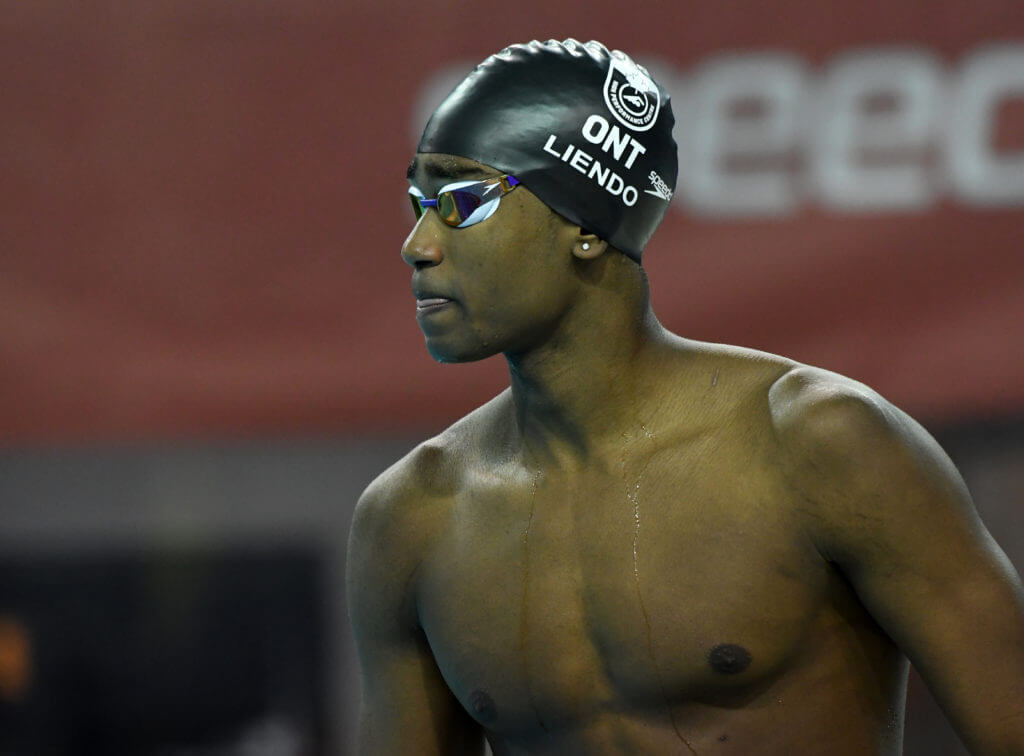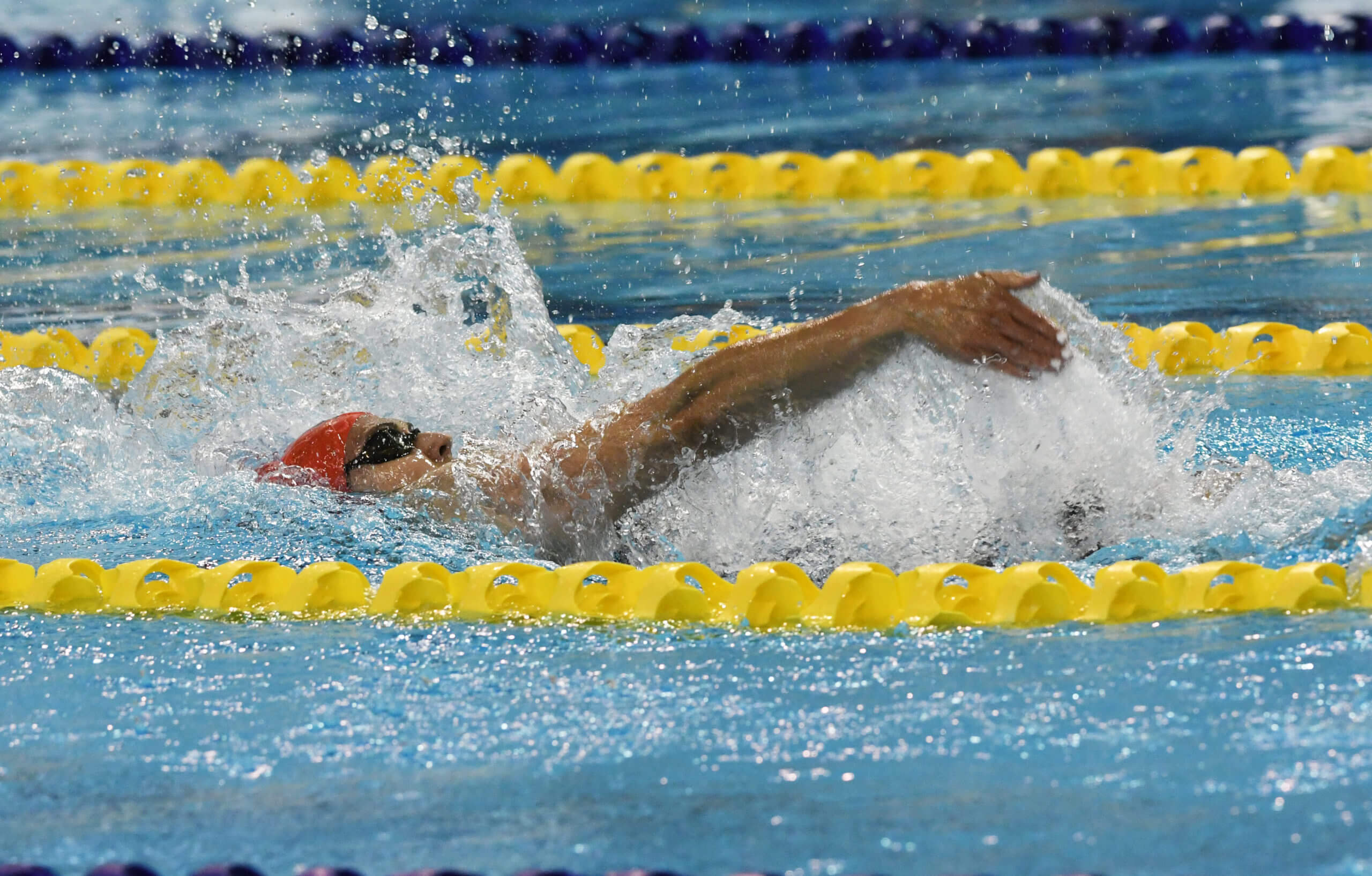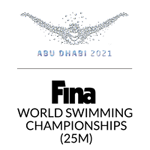Historic Short-Course Worlds Cements Canada’s Place as Swimming Power

Historic Short-Course Worlds Cements Canada’s Place as Swimming Power
Canada took 12 swimmers to Abu Dhabi, not filling the plane with enough men to even qualify a relay at the FINA Short Course World Championships.
It left the UAE after six illustrious days with 14 national records (nine individual) and second place on the medal table with 15. For a team that has redefined success in 2021, the last installment was a fitting capper.
Canada brought a streamlined delegation – what High Performance Director John Atkinson called before the meet a “low-key, calm, focused, professional” group. The yield of seven gold medals reflected that focus.
It all must be taken with a slight grain of salt in a pandemic year, in which Australia didn’t send a team and several top athletes missed out, for reasons that range from COVID to other illnesses to unplanned post-Olympic fatigue. But even so, the 15 medals are a near doubling of Canada’s previous high from a short-course Worlds (eight in 1999 and 2016) and includes the first three-gold-medal day at a Worlds and the first 1-2 event finish since 1995.
What Canada achieved was, for not the first time this year, a statement of intent by a program that is no longer growing into a world power but rather cementing its place as one of the top two or three.
Some of the records set in Abu Dhabi weren’t just notable for how long they’d stood but for how summarily they were dismissed. For Joshua Liendo to trim .58 off a 50 free record that had stood since 2009 or lop nine tenths off the 100 butterfly mark is massive. The same applies for Summer McIntosh’s 6.5-second trouncing of the 800 free record.
Any super-suit record downed is notable. But when it’s done by swimmers like Liendo and McIntosh, respectively seven and three years old in that heady final hurrah of tech suits in 2009, it’s even more notable.
Liendo’s performance lays down a marker for the men’s program. For years, the narrative has centered on an ascendant women’s program with the men lagging. The emphasis on process, though, augured that eventually what worked for the women would bear fruit for the men.
That time is here, and Liendo is the standard-bearer. The 19-year-old was part of the mixed 200 free relay gold medal squad. He added bronze medals in the 50 and 100 free, setting a Canadian record in the former, plus a pair of national records in the sprint fly events. Liendo is the first Black Canadian swimmer to win an individual medal at a major international event.
“I was just coming here to learn stuff,” Liendo said after the semis of the 50 free. “I wanted to see how I could get better, and it went a lot better than expected. It’s been great.”
Four of the five individual records came from men, with Finlay Knox lowering the 100 IM mark (he and Javier Acevedo have jockeyed back and forth on that during the International Swimming League season.) At 20, Knox is another rising star.

With 11 Worlds medals, Kylie Masse is the most decorated Canadian swimmer in history; Photo Courtesy: Scott Grant/Swimming Canada
Then there’s the women, who need no preamble after stunning in Tokyo. But the main protagonist there, Penny Oleksiak, was notably absent in Abu Dhabi, as she tries to regain full strength after back issues in the spring.
Maggie MacNeil has entered her name into the conversation – alongside Sarah Sjostrom and Siobhan Haughey – as one of the premier all-around swimmers in the world. To set a world record in the 50 backstroke, not even her signature event, is a testament to her excellence. She added a 100 fly title, the event that most people know her for thanks to her Tokyo gold, and could’ve medaled in the 100 back had the schedule worked out.
“If you told me my first world record would be backstroke, I wouldn’t have believed you,” MacNeil said. “But I knew if I could fix my turns, there was a chance. That was definitely my goal coming into this meet.”
Making MacNeil’s performance even more impressive is how Kylie Masse and Ingrid Wilm had circled around the 50 back national record this year. Masse reclaimed the 100 back mark from Wilm, who wasn’t on the Worlds team, on the way to a silver sweep of the three backstroke events. Her four silvers bring her to 11 career Worlds medals, short- and long-course, breaking a tie with Oleksiak and Ryan Cochrane for the most in program history.
“It’s hard to believe,” Masse said. “It’s a great honor to achieve that title. I started off a young kid in club swimming wanting to achieve big things in the sport and I’m thankful to be in this sport, to be surrounded by so many amazing athletes, coaches and support personnel.”
The record-setting is apparently contagious. Rebecca Smith, known mostly as a relay cog, took down Taylor Ruck’s record in the 200 free at 1:52.24. And Canada quietly swept the women’s IMs, with Tessa Cieplucha and Sydney Pickrem doing the honors, the latter ending what she called “the hardest year of my swimming career” with a deserved piece of hardware.
It’s another testament to Canada’s stunning depth. To accomplish this much without Oleksiak, with Ruck still working through personal issues that she detailed for the first time this week, with genuine ISL contributors like Wilm and Mary-Sophie Harvey unable to even make the cut, on the end of an unprecedented 2021 that included an Olympics straight into a busy fall of ISL and World Cup … it’s a stirring statement on the program’s strength.
“From Day 1 to Day 6 we were competitive through the whole event,” Atkinson said. “That’s down to the work ethic and the professionalism of our athletes, coaches, and of our support staff, working every minute in the prelims and finals to get the best support for the athletes. The athletes have had a fantastic set of performances here and it sets everybody up for what comes in 2022 with the major Games and championships we have coming up.”




